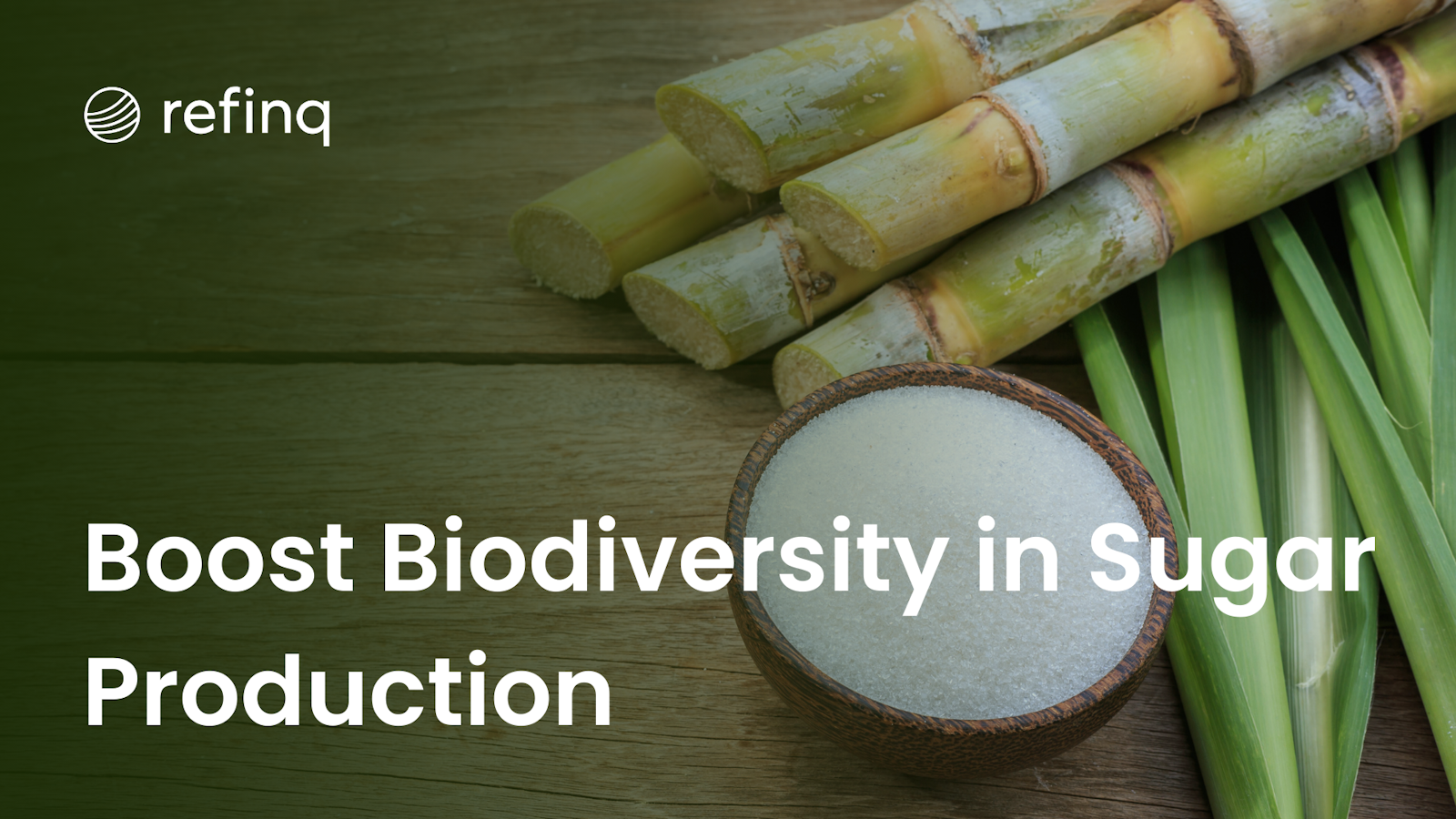

In sustainable agriculture, biodiversity is essential for resilient ecosystems and ecological balance. This is particularly relevant for the sugar industry, which has a high environmental impact due to intensive land use and chemical dependency. A sustainable sugar value chain balances productivity with ecosystem health by incorporating biodiversity-enhancing practices at every stage, from cultivation to processing.
A biodiversity-focused approach reduces the need for synthetic fertilizers and pesticides, promoting a healthier environment. Platforms like refinq help enterprises assess climate and biodiversity risks, aligning practices with environmental goals. This approach fosters economic and environmental resilience, supporting biodiversity and creating a stable foundation for the future.
Understanding Biodiversity in Agricultural Value Chains
Biodiversity in agriculture refers to the variety of species, plants, animals, and microorganisms within agricultural systems. This diversity supports nutrient cycling, pest control, and pollination, all essential for sustainable farming. Biodiversity enhances soil fertility, supports pest resistance, and aids in natural resource regeneration, which are crucial for sustainability.
In the sugar industry, biodiversity supports soil health, pest regulation, and pollination. A well-maintained ecosystem reduces dependency on synthetic inputs, making production more sustainable. Protecting biodiversity within agricultural ecosystems promotes stability, ensuring resources remain productive for future generations. Adopting better management practices (BMPs) that focus on environmental conservation can lead to increased productivity. For example, a WWF-Brazil study found that Bonsucro-certified sugarcane plantations had an average productivity 15% higher than the national average. This suggests that integrating biodiversity considerations into sugarcane cultivation can enhance yields and profitability. Organizations like Bonsucro advocate for biodiversity-friendly practices in sugar production to ensure an eco-friendly industry.
Sustainable practices like agroecological methods, which integrate natural processes into farming, are essential. refinq's Portfolio Impact Assessment offers insights into sustainable land use and supports biodiversity management in sugar production.
Strategies like mixed cropping, crop rotation, and cover cropping promote biodiversity within sugar production. These practices encourage diverse plant and animal life, reduce soil degradation, and mitigate the risks associated with monoculture, limiting pest outbreaks and supporting a stable ecosystem.
Healthy soil is foundational to biodiversity, supporting organisms vital to plant growth and nutrient cycling. Sustainable practices like reduced tillage, organic amendments, and cover cropping improve soil structure and maintain fertility, enhancing crop resilience and productivity.
Monoculture in sugar plantations reduces biodiversity, creating a uniform environment that demands higher chemical inputs. Transitioning to diverse cropping systems poses financial challenges but is critical for sustainability. refinq’s Footprinting solution helps companies assess their environmental footprint, promoting sustainable practices.
Land conversion and deforestation for sugar plantations impact biodiversity by reducing habitats. One Planet Network provides resources on managing land use, and refinq assists with sustainable land management risk evaluations.
Extensive pesticide and fertilizer use can harm biodiversity, affecting soil organisms and non-target species. Alternatives like integrated pest management (IPM) and organic fertilizers reduce chemical dependency, creating a safer environment for wildlife and preserving soil health.
Biodiversity corridors and buffer zones facilitate species movement and maintain ecosystem connectivity. Implementing these zones around sugar plantations protects habitats and prevents biodiversity loss. Conservation organizations collaborate with the industry to establish buffer zones that support wildlife and sustainable agriculture.
Protecting habitats from degradation requires partnerships with conservation groups. World Wildlife Fund outlines strategies for biodiversity support in the sugar industry.
Regenerative agriculture emphasizes biodiversity through cover cropping and crop diversification. These methods align with refinq’s Benchmarking Tools for environmental resilience and biodiversity management.
Farmers, companies, consumers, and NGOs are essential in promoting biodiversity-friendly practices. Farmers implement sustainable techniques, companies provide resources, consumers demand sustainable products, and NGOs offer expertise to support biodiversity within the industry.
Partnering with conservation organizations amplifies biodiversity efforts in sugar production, providing valuable insights, resources, and guidance for effective biodiversity management.
Government policies incentivize sustainable practices, motivating sugar producers to adopt biodiversity-enhancing techniques. Unilever’s Sustainable Sourcing showcases a company commitment to biodiversity.
A biodiversity-rich sugar value chain promotes soil health, enhances water conservation, and builds resilience to climate change. Diverse ecosystems adapt better to environmental changes, making them more resilient to climate impacts.
Biodiversity reduces reliance on costly inputs by fostering natural pest control and soil fertility. This increases resilience, reduces production costs, and improves profitability, benefiting both farmers and companies.
Sustainable practices contribute to healthier communities by reducing exposure to harmful chemicals and supporting local economies. A biodiversity-friendly approach also enhances food security and quality of life for communities in the sugar industry.
Several companies have successfully integrated biodiversity in sugar production. Initiatives involving biological pest control and buffer zones have positively impacted local ecosystems and crop resilience.
Practices from other sectors, such as forestry and coffee production, offer valuable insights for sugar producers. Agroforestry, commonly used in coffee, integrates trees into agricultural landscapes, benefiting biodiversity and improving soil and water conservation.
Implementing biodiversity-friendly practices can be challenging due to financial and logistical constraints. Supporting farmers with financial incentives, training, and access to sustainable resources can ease this transition.
Technological advancements like precision agriculture allow sugar producers to monitor biodiversity and optimize resources effectively, enhancing biodiversity management.
Achieving a sustainable sugar industry requires commitment to continuous improvement and innovation, integrating biodiversity at every level, from production to processing, and using data-driven solutions to assess environmental impacts.
refinq’s platform provides real-time risk assessments and environmental impact forecasts, essential for sustainable sugar production. With tools for due diligence and biodiversity risk assessment, businesses can align operations with conservation goals and ensure effective biodiversity management. The platform’s data-driven insights, based on machine learning and geospatial analysis, support effective biodiversity and climate risk management. Sugar industry companies use refinq’s tools to conduct due diligence, evaluate portfolio impacts, and design nature-positive strategies, contributing to a more resilient and sustainable value chain.
A sustainable sugar value chain that promotes biodiversity is essential for ecosystems and long-term industry resilience. Integrating biodiversity-focused practices in sugar production can improve environmental health, economic stability, and social well-being, benefiting all stakeholders. By adopting nature-positive strategies and utilizing platforms like refinq, industry players can take meaningful steps toward a more sustainable and biodiversity-friendly future.